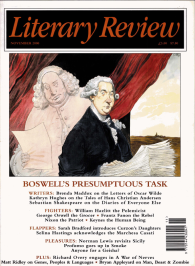Richard Gott
Anti-Colonialist Hero who Urged Violence
Frantz Fanon: A Life
By David Macey
Granta Books 640pp £25
Angry advocate of violence and sombre prophet of the anti-colonial struggle, Frantz Fanon was also a natty dresser and enjoyed a gin-and-tonic. A black, middle-class psychiatrist from Martinique, who had fought for the Free French in the Second World War, he was to emerge after his death from leukaemia in 1961, at the early age of thirty-six, as one of the most enduring influences on the newly emerging Third World, a visionary who believed that violent revolution was not only justified but necessary.
As a citizen of the French empire, Fanon moved from metropolitan France in 1953 to a mental hospital in Blida, in French Algeria. There he was soon caught up in the great Algerian rebellion that began in 1954 and ended with independence eight years later in 1962. Fanon was obliged

Sign Up to our newsletter
Receive free articles, highlights from the archive, news, details of prizes, and much more.@Lit_Review
Follow Literary Review on Twitter
Twitter Feed
The era of dollar dominance might be coming to an end. But if not the dollar, which currency will be the backbone of the global economic system?
@HowardJDavies weighs up the alternatives.
Howard Davies - Greenbacks Down, First Editions Up
Howard Davies: Greenbacks Down, First Editions Up - Our Dollar, Your Problem: An Insider’s View of Seven Turbulent...
literaryreview.co.uk
Johannes Gutenberg cut corners at every turn when putting together his bible. How, then, did his creation achieve such renown?
@JosephHone_ investigates.
Joseph Hone - Start the Presses!
Joseph Hone: Start the Presses! - Johannes Gutenberg: A Biography in Books by Eric Marshall White
literaryreview.co.uk
Convinced of her own brilliance, Gertrude Stein wished to be ‘as popular as Gilbert and Sullivan’ and laboured tirelessly to ensure that her celebrity would outlive her.
@sophieolive examines the real Stein.
Sophie Oliver - The Once & Future Genius
Sophie Oliver: The Once & Future Genius - Gertrude Stein: An Afterlife by Francesca Wade
literaryreview.co.uk